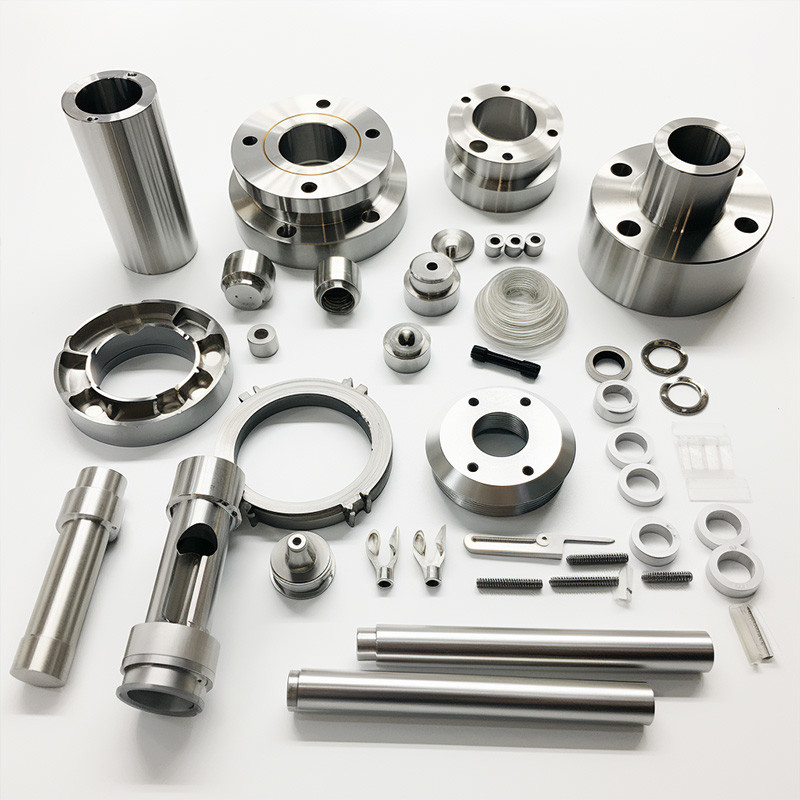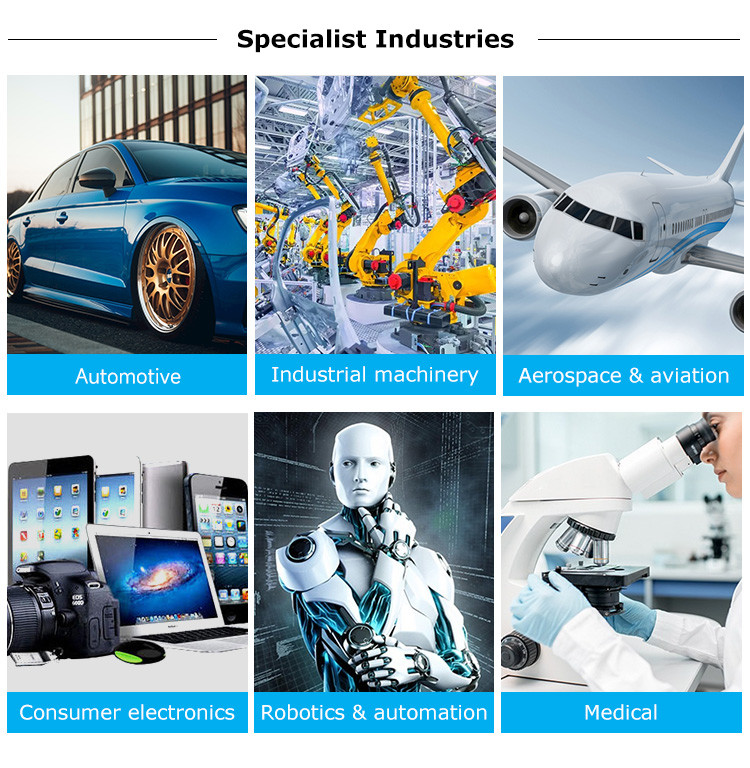Dongguan Yexin Intelligent Technology Co., Ltd. |
|
Verified Suppliers
|
|
CNC machining operates through subtractive processes, signifying that the feedstock is shaped
into its final form by systematically removing material. This involves drilling holes, boring lots
and pathways, and molding metal stock into new material with diverse tapers, diameters,
and shapes.
In subtractive manufacturing, the desired shapes are achieved by material removal, setting it
apart from additive manufacturing methods where materials are added and layered to attain
a specified form.
It also differs from injection molding, which involves injecting material into a mold in a different
state of matter to achieve a specified shape. CNC machining's adaptability extends to various
materials, including metals, plastics, wood, glass, foam, and composite materials, making it a
favored choice for efficient and precise fabrication across industries.
Product Details
Stainless Steel Finishing and Post-Processing
| Name | Machining Marks |
| Brushed + electropolishing | Removed on Primary surfaces |
| Electroless nickel plating | Reduced but visible |
| As machined | Visible, light surface scratches |
| Smooth machining | Visible, light surface scratches |
| Fine machining | Slightly visible |
| Polishing | Removed on primary surfaces |
| Bead blasting | Removed for non-cosmetic, removed on primary surfaces for cosmetic |
| Brushing | Reduced for non-cosmetic, removed on primary surfaces for cosmetic |
| Powder coating | Removed |
| Black oxide | Visible |



Stainless Steel Machining Services
Our state-of-the-art machine shops are equipped to manufacture tailor-made stainless steel
components utilizing CNC turning machines and 3- and 5-axis CNC milling machines.
Our facilities boast a diverse range of 11 stainless steel types, including Stainless Steel 304,
Stainless Steel 316, Stainless Steel 303, Stainless Steel 17-4PH, Stainless Steel 416,
Stainless Steel 2205 Duplex, Stainless Steel 420, Stainless Steel 440C, Stainless Steel 430,
Stainless Steel 301, and Stainless Steel 15-5, enabling us to meet a wide array of project
requirements.
| Common Stainless Steel Materials | |
| No. | Properties |
| Stainless steel 304/304L | Stainless steel 304L (CNC) has excellent mechanical properties and good machinability. Resistant to most environments and corrosive media. |
| Stainless steel 316/316L | Stainless steel 316L (CNC) has similar mechanical properties to 304, with higher corrosion and chemical resistance. Ideal for marine applications. |
| Stainless steel 303 | Stainless steel 303 (CNC) has excellent toughness, but lower corrosion resistance than 304. Ideal for high volumes, due to its excellent machinability. |
| Stainless Steel 17-4 PH | Stainless steel 17-4 (CNC) - SAE grade 630 - is a precipitation hardening alloy with good corrosion resistance. Can be hardened up to 44 HRC. |
| Stainless steel 416 | Stainless steel 416 is magnetic and has a high machinability. |
| Stainless steel 2205 Duplex | Stainless steel 2205 Duplex (CNC) is the alloy with the highest strength and hardness. Suitable for applications in severe environments up to 300°C. |
| Stainless steel 420 | Stainless steel 420 provides high strength and corrosion resistance. It is the hardest of all stainless steels when hardened. |
| Stainless steel 440C | Stainless steel 440C has improved toughness and corrosion resistance due to Carbon and Chromium content. |
| Stainless steel 430 | Stainless steel 430 is magnetic and corrosion resistant. |
| Stainless steel 301 | Stainless steel 301 is corrosion resistant similar to Stainless steel 304. |
| Stainless steel 15-5 | Stainless steel 15-5 has a higher toughness than 17-4, better corrosion resistance and transverse properties compared to other similar martensitic grades. |
CNC Machining Applications
CNC machining finds diverse applications across various industries. In the woodworking sector,
CNC machining is extensively used for:
1. Woodworking Industries:
CNC machining plays a crucial role in the production of wooden
furniture, offering time and cost
savings. It enables the creation of furniture with intricate geometries that would be labor-intensive
and costly to achieve manually.
2. Lettering and Engraving Systems:
CNC machining is employed for applications that involve engraving
tools to mark patterns or text
onto surfaces. This is utilized for artistic purposes or for serializing parts.
3. Electrical Industry:
The demand for CNC-machined parts in the electronics industry is
vast. CNC machining is used
for tasks such as machining component mounting holes in printed circuit boards and creating
aluminum or copper heat sinks for heat-generating electrical components.
4. Pharmaceutical Industry:
CNC machines are utilized in the pharmaceutical industry to
manufacture precise equipment for
the production of pharmaceutical products. This includes applications like machining extremely
precise metering pumps, ingredient-dispensing nozzles, and packaging.
5. Food and Beverage Industry:
CNC machining plays a role in the fast-moving consumer goods
industry, where custom
material-handling machinery incorporates CNC machined parts. Additionally, injection molds
for food packaging made from plastics are CNC machined.
The versatility of CNC machining extends across industries, contributing to the efficiency and
precision of various manufacturing processes.

Company Profile


Factors Affecting Machining Costs
The cost of CNC machining projects is influenced by various factors
that have a significant impact
on the overall cost calculation. Manufacturers looking to optimize their processes and manage
expenses effectively should have a thorough understanding of these key elements that determine
machining costs.
Let's delve into the factors that play a crucial role in determining the cost of CNC machining:
1. Material Selection:
The choice of raw material directly affects machining costs.
Different materials come with varying
costs, availability, and machining characteristics. High-performance alloys, for instance, may be
more expensive than common metals. Material availability also affects pricing.
When calculating machining expenses, it's essential to consider the type of material required for
CNC machined parts and its associated cost.
2. Complexity of Design:
The complexity of the machined part or component is a significant
cost determinant. Parts with
intricate features, tight tolerances, and complex geometries often necessitate advanced machining
techniques, specialized tooling, and longer machining time.
These factors increase overall costs due to the additional precision and expertise required to
produce such complex components.
3. Machining Time:
Machining time is a critical factor in CNC cost calculation. The
longer it takes to machine a part,
the higher the cost. Machining time includes cycle time (the time spent cutting the part), setup
time (preparation and tool changes), and overall production efficiency.
Optimizing machining processes to reduce cycle time and enhance setup efficiency can minimize
costs and boost productivity.
4. Machine Tooling:
The choice and management of machine tooling have a significant
impact on machining costs.
Considerations should include tooling costs, encompassing the purchase, maintenance,
and replacement of cutting tools. The lifespan of cutting tools and the time required for tool
changeovers affect production efficiency and, consequently, cost. Proper selection, maintenance,
and optimization of machine tooling can help control expenses in CNC machining.
5. Volume and Batch Size:
Production volume and batch size directly influence machining
costs. Economies of scale come
into play with larger volumes. The cost per part typically decreases as production quantities
increase. However, it's crucial to strike a balance between volume and setup time.
Small batch sizes may have higher costs per part due to increased setup time, while larger
volumes benefit from reduced setup time and lower costs per part.
6. Labor Costs:
Labor costs, encompassing the wages of CNC machining engineers and
operators, make a
significant contribution to CNC machining expenses. Skilled operators with expertise in CNC
programming, setup, and operation are essential for efficient and accurate machining.
Labor-intensive operations or intricate part requirements may involve additional labor costs.
Finding the right balance between utilizing skilled labor and cost management is crucial in
controlling machining expenses.
7. Overhead Costs:
Overhead costs associated with CNC machining operations can impact
the overall cost calculation.
These costs include facility expenses, utilities, administrative costs, quality control, and inspection.
Managing and optimizing these overhead expenses are vital for cost control and maintaining a
competitive edge in CNC machining.
8. Scrap and Rework:
Scrap and rework costs are important considerations in machining
expenses. Material wastage
due to errors or deviations from specifications can significantly increase costs. Minimizing scrap
through effective quality control measures, precision machining techniques, and robust inspection
processes helps reduce material waste and the need for rework, ultimately lowering overall
machining costs.
By comprehending and analyzing these factors that affect machining costs, manufacturers can
identify areas for improvement, implement cost-saving strategies, and optimize their CNC
machining processes to achieve greater efficiency and profitability.